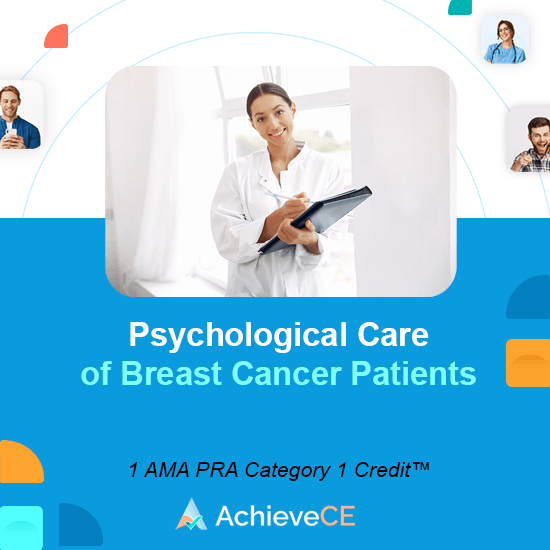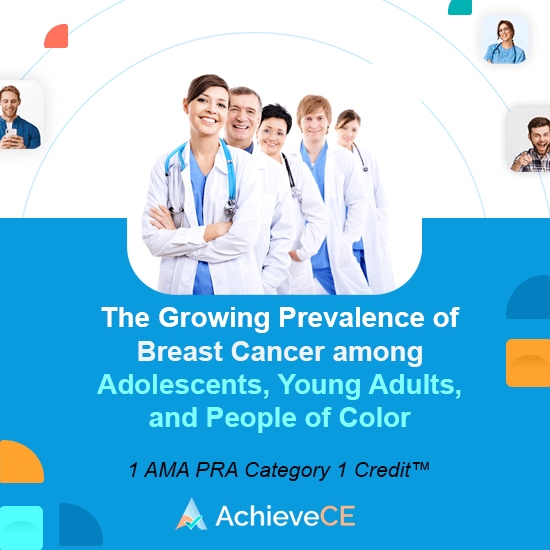Oncology CME
31 - 38 of 38 results
-
UNAVAILABLE
ScientiaCME Advanced hepatocellular carcinoma (HCC) including updates from the European Society for Medical Oncology (ESMO) 2023 and other recent society meetings
- Credit hours: .75
- Format: On-Demand Online
- Material last updated: 02/03/2024
- Expiration of CME credit: 02/03/2025
-
UNAVAILABLE
ScientiaCME Myeloma bone disease: Monitoring and management
In this online, self-learning activity:
Multiple myeloma (MM) is the most common hematologic malignancy after non-Hodgkin lymphoma, with an incidence of over 34,000 and an annual mortality rate of over 12,000. MM-induced osteocyte apoptosis facilitates MM cell survival, and patients with MM are at high risk for bone disease. Osteolytic lesions are reported in up to four out of five newly diagnosed with MM, and throughout their disease course, up to 90% of patients will eventually develop bone lesions. The presence of bone lesions increases MM patient risk for skeletal-related events (SREs), such as fractures, spinal cord compression, or need for surgery or radiotherapy. Bone disease and SREs can have serious consequences in MM, leading to worsened quality-of-life and prospects for survival. Patients who experience fracture after MM diagnosis have a two-fold increased risk of death relative to those who do not experience fracture. Yet bone disease frequently goes untreated in patients with MM, suggesting that clinicians are not familiar with the serious effects of MM.
See full details chevron_right- Credit hours: .75
- CME credits awarded by: ScientiaCME
- Expiration of CME credit: 12/21/2024
-
UNAVAILABLE
ScientiaCME Contemporary treatment approaches in the management of graft-versus-host disease (GVHD)
Activity Description / Statement of Need:
In this online, self-learning activity:
Graft-versus-host disease (GvHD) is an immune-mediated response that occurs in recipients of allogenic hematopoietic cell transplantation (HCT). GvHD can be further categorized into acute and chronic cases. Maculopapular rash, follicular erythema, epidermolysis, are common manifestations of acute GvHD, in addition to liver and gastrointestinal dysfunction such as hyperbilirubinemia, nausea, and diarrhea. This activity focuses on chronic GvHD, which has more extensive multi-organ involvement including the liver, eyes, mouth, lungs, skin, genitalia, and gastrointestinal tract.
Target Audience:
The following HCPs: hematologists and oncologists; nurse practitioners, physician assistants, and pharmacists who specialize in oncology; and those who otherwise commonly care for or clinically encounter patients with GVHD.
See full details chevron_right- Credit hours: 1
- CME credits awarded by: ScientiaCME
- Format: On-Demand Online
- Material last updated: 03/31/2023
- Expiration of CME credit: 03/31/2025
-
UNAVAILABLE
ScientiaCME Preventing and mitigating skeletal-related events in breast cancer
Each year, more than 290,000 cases of breast cancer are diagnosed, making it the leading cause of cancer among females in the United States. Although earlier screening and more effective treatment options have improved outcomes among people with breast cancer, more than 43,000 people die from this type of cancer each year. Throughout the course of breast cancer management, bone health remains an important consideration. In early breast cancer, chemotherapy-induced ovarian failure and endocrine therapy can contribute to BMD loss and subsequent osteoporosis and fracture. In advanced breast cancer, about 70% of all patients will experience bone metastases, placing patients at risk for SREs. In fact, breast cancer is associated with the highest risk of SREs among all tumor types.
Maintaining bone health in patients with breast cancer requires routine monitoring and proactive management to minimize the risk of BMD loss, osteoporosis, and SREs. Guidelines therefore recommend that patients with non-metastatic breast cancer initiating aromatase inhibitors or other treatment that causes bone loss undergo dual-energy X-ray absorptiometry (DXA) scans to assess baseline BMD. Furthermore, patients at risk for osteoporosis should receive regular follow-up DXA scans to monitor for BMD loss. This represents an opportunity for ongoing education about the need for monitoring to ensure maintenance of optimal bone health.
See full details chevron_right- Credit hours: .75
- CME credits awarded by: ScientiaCME
- Format: On-Demand Online
- Material last updated: 10/27/2022
- Expiration of CME credit: 10/27/2024
-
UNAVAILABLE
AchieveCE Psychological Care of Breast Cancer Patients
From October to December, 2022, 50% of the proceeds from this course will be donated to the National Breast Cancer Foundation. Despite the advances in breast cancer detection and treatment, on the psychological side, clinicians who have been involved in the emotional care of cancer patients can report that a breast cancer diagnosis can nevertheless generate many concerns for patients, as well as their families. Psychological interventions for breast cancer patients have well-documented success in reducing distress and enhancing psychosocial adaptation to disease. As such, these interventions have been highlighted as important mechanisms by which physical health can be improved. This activity focuses on the common issues that impact psychological adjustment to breast cancer and interventions that will help optimize care in the cancer context.
See full details chevron_right- Credit hours: 1
- Format: Online Video
- Expiration of CME credit: 10/18/2023
-
UNAVAILABLE
AchieveCE The Growing Prevalence of Breast Cancer among Adolescents, Young Adults, and People of Color
There is a growing prevalence of breast cancer among adolescents and young adults (AYAs) aged 15 to 39 years old, and people of color (POCs). Breast cancer tends to present as more advance and aggressive forms in both of these demographics and is unfortunately associated with higher mortality rates than other populations in whom mortality rates have been decreasing over the last few decades.
This activity highlights the current trends, challenges, and health disparities experienced by AYAs and POCs with breast cancer, and provides insight into possible ways of improving screening and overall management of these patients.
See full details chevron_right- Credit hours: 1
- CME credits awarded by: 1 AMA PRA Category 1 Credit™ by Continuing Education Company, Inc. and AchieveCE, ACPE, AGD PACE, and ANCC.
- Format: Online Video
- Expiration of CME credit: 10/18/2023
-
UNAVAILABLE
ScientiaCME Hitting management strategies of metastatic nasopharyngeal carcinoma on the nose
- Credit hours: 1
- Format: On-Demand Online
- Material last updated: 03/19/2024
- Expiration of CME credit: 03/19/2025
-
UNAVAILABLE
ScientiaCME Treatment considerations in relapsed or refractory chronic lymphocytic leukemia (R/R CLL): evolving approaches to an evolving disease landscape
- Credit hours: 1
- Format: On-Demand Online
- Material last updated: 04/21/2024
- Expiration of CME credit: 04/21/2025




